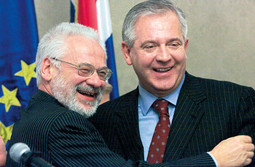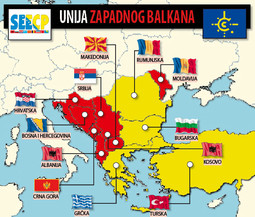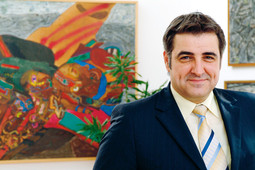Published in Nacional number 588, 2007-02-20
GOVERNMENT'S SCANDALOUS DECISION
Croatia in a Balkan Federation as of 9 May
Following the creation of a zero-tariff Western Balkan union, a summit in Zagreb will establish the political body that is to administer the region
 Despite resistance from Croatian negotiators and months of diplomatic struggle, Croatia will, with the start of May of this year, become a member of two political and economic associations of the countries of Eastern Europe, already bearing the Balkan Federation moniker in diplomatic circles. With the first of May a treaty will come into force on a new CEFTA or Central European Free Trade Zone, which will become the economic organisation of the six countries of the former Yugoslavia, Albania and Moldavia with the political seat. Only ten days later, on 11 May, Zagreb will host a meeting of heads of states and governments that will amend the charter on the South Eastern European Cooperation Process (SEECP) by which this association, launched in the frame of the Stability Pact, will become a firm political organisation with an institutionalised seat and headed by a secretary-general.
Despite resistance from Croatian negotiators and months of diplomatic struggle, Croatia will, with the start of May of this year, become a member of two political and economic associations of the countries of Eastern Europe, already bearing the Balkan Federation moniker in diplomatic circles. With the first of May a treaty will come into force on a new CEFTA or Central European Free Trade Zone, which will become the economic organisation of the six countries of the former Yugoslavia, Albania and Moldavia with the political seat. Only ten days later, on 11 May, Zagreb will host a meeting of heads of states and governments that will amend the charter on the South Eastern European Cooperation Process (SEECP) by which this association, launched in the frame of the Stability Pact, will become a firm political organisation with an institutionalised seat and headed by a secretary-general. The EU's plan is clear: now that a tariff-free union of the Western Balkans has been created, the entire affair is to receive a political platform, i.e. a body that will politically administer the region. Croatia, the only country in this company with the status of an EU membership candidate, will have to negotiate a phase of several years of formal political coexistence with countries the majority of which are not even members of the World Trade Organisation.
Croatia currently presides over the South Eastern European Cooperation Process, an association whose participants, besides the countries of CEFTA, Bulgaria, Romania, Greece and Turkey, and which will at the Zagreb summit acquire the contours of a federation. The introduction of the concepts of the membership of the countries of the region and that of a donor have been agreed upon. The institutional seat, headed by a secretary-general, will be in Sarajevo and, as Croatia presides over the Process, it is presumed that Hido Biscevic, currently State Secretary at the Ministry of Foreign Affairs, could be the first to be appointed to the function. In a short interview for Nacional, Biscevic stated that the process of co-ordination has not yet begun and neither the seat nor the name of the Secretary-General are yet known. "The political directors of the SEECP countries worked last week on the text of a document that will regulate the procedures involved in proposing the seat of the organisation and Secretary-General. This text will be taken under consideration again on the eve of the ministerial conference of 28 February, at which the ministers of the participant countries are to approve the document. That means that over the coming two months all of the participants will have the right to propose cities and political directors. For now formal candidatures have been put forward by Sarajevo, Belgrade and Skopje", said Hido Biscevic.
A third of the money needed for the operations of the Secretariat, which will at the Zagreb summit acquire a legal status, will be financed by the European Commission, while the member countries will provide a million euros a year each. Also to be introduced is the concept of a regional cooperation council, to be composed of the member states and representatives of the European Commission. Because of the fact that Croatia by its membership in this council looses a part of its sovereignty even prior to EU accession, Prime Minister Sanader is trying to delay the entire process for the period after the parliamentary elections, scheduled for November of this year. Aware of the fact that the Croatia public will not accept the country's accession to new Balkan associations with open arms, the Government is doing its best to find arguments that would soften the negative public opinion. Hido Biscevic in this regard recently called a meeting of ministers at which he called for a list of the economic benefits Croatia is to have from this association. Besides the negative political connotations, which the current Government would certainly like to avoid in the pre-electoral year, well-informed sources feel that the accession to a unitary unified political and tariff-free Western Balkan organisation, in which the rules of the World Trade Organisation would not apply, could be to Croatia's detriment on the long run to the tune of hundreds of millions of euros.
 The future CEFTA is to be made up of eight states: Bosnia & Herzegovina, Serbia, Macedonia, Kosovo, Albania, Moldavia, Montenegro and Croatia which, under pressure from Brussels, accepted a provision whereby new members need not first accede to the World Trade Organisation. It is interesting that Moldavia was thrown in subsequently, after a deal was struck according to which the EU would take that state under its patronage and Russia would take the Ukraine under its. Prime Minister Ivo Sanader had previously stated that it was he who had first opposed the creation of a Western Balkan free zone and that he had, on behalf of Government, proposed the widening of CEFTA to neighbouring countries and to Moldavia and the Ukraine. The initiative emerged in Sofia in June of 2004, when the economy ministers of the Balkan states discussed the EU proposal to set up a trade zone in the region. After a while Sanader realised that an association linking the states of the former Yugoslavia could be to his detriment and saw to it that the zone would operate under the CEFTA umbrella. The problem is that CEFTA has been in the meantime deserted by new EU members Slovenia, the Czech Republic, Slovakia and Hungary and, as of 1 January, Romania and Bulgaria.
The future CEFTA is to be made up of eight states: Bosnia & Herzegovina, Serbia, Macedonia, Kosovo, Albania, Moldavia, Montenegro and Croatia which, under pressure from Brussels, accepted a provision whereby new members need not first accede to the World Trade Organisation. It is interesting that Moldavia was thrown in subsequently, after a deal was struck according to which the EU would take that state under its patronage and Russia would take the Ukraine under its. Prime Minister Ivo Sanader had previously stated that it was he who had first opposed the creation of a Western Balkan free zone and that he had, on behalf of Government, proposed the widening of CEFTA to neighbouring countries and to Moldavia and the Ukraine. The initiative emerged in Sofia in June of 2004, when the economy ministers of the Balkan states discussed the EU proposal to set up a trade zone in the region. After a while Sanader realised that an association linking the states of the former Yugoslavia could be to his detriment and saw to it that the zone would operate under the CEFTA umbrella. The problem is that CEFTA has been in the meantime deserted by new EU members Slovenia, the Czech Republic, Slovakia and Hungary and, as of 1 January, Romania and Bulgaria.
Even though Serbia and Bosnia & Herzegovina have, with the 18 December 2006 signing of the CEFTA treaty in Bucharest, abandoned the collection of customs duties on Croatian tobacco and agricultural products, a complete liberalisation is for the moment uncertain and Croatia in the new organisation loses all of the instruments it has for exerting pressure. The problem for Croatia, point out Nacional's sources close to the negotiating team, is the fact that CEFTA will be an institutionalised market. A CEFTA secretariat will be established soon with a temporary seat in Brussels, and a consensus of member states will be sought in all decision-making and problem solving processes within the organisation. Instead of the bilateral treaties on free trade to date, whereby 95 percent of the trade in the region has been liberalised, CEFTA will introduce a single treaty that integrates all of those signed to date. The treaty becomes multilateral and defines the Western Balkans as a tariff-free market.
From the aspect of the market, the new CEFTA will have the same effect as the current bilateral agreements on free trade. However, Nacional's sources warn that the unitary treaty will introduce liberalisation in the area of services, which has not been entirely accepted even within the frame of the World Trade Organisation. "In other words, banks and telecommunications companies will no longer have to open branches or subsidiaries in each of the countries in the region, but will be able to have a single regional headquarters and the same operating conditions on the territory of the new CEFTA. This will suit large foreign investors in the forthcoming opening of the energy market. The profit will go only to foreign capital, the countries of the region will not have much benefit from it, but this is something no one is even trying to make as secret of. Foreign capital has anyways already taken what it wanted, and it is now only facilitating the conditions in which it does business", says Nacional's source close to the Croatian negotiating team. Croatia's accession to CEFTA is also becoming its political problem. The old CEFTA, namely, which united Central Europe, was exclusively a trade association, without institutions, in which every member was obliged to fulfil three preconditions: to be a candidate for EU membership, to have signed bilateral agreements on free trade with the other participant countries, and to be a member of the World Trade Organisation. Serbia, Montenegro and Bosnia & Herzegovina did not have the opportunity to fulfil these preconditions, so in Brussels they hit upon the idea of creating a single treaty, but without the mentioned conditions. And so Croatia has, with its accession to this kind of organisation, in fact consented to lower standards than those it has already achieved and become part and parcel of a market that will, if its lasts a few years, be hard to break up. By accepting accession to CEFTA under these conditions Sanader has struck the Croatian economy a hard blow, which will be used in the pre-electoral year by his political opponents.
For example, Croatia has a signed treaty on free trade with Bosnia & Herzegovina. In spite of this fact that country last year suspended a part of the treaty relating to agricultural products. The result is an annual loss of several hundred million kunas, and at the same time Government has not undertaken anything to force Bosnia & Herzegovina to respect the treaty. It was the result of several months of pressure on the part of Erhard Busek in order to secure the signing of the CEFTA treaty in December of 2006. The experts with whom Nacional spoke warn that, unlike to current situation, with the coming into force of the CEFTA treaty in May, Croatia will no longer possess a single means of exerting pressure. The treaty, namely, has a provision according to which all problems are to be solved by joint negotiation at the Secretariat in Brussels – by consensus. The key word in the treaty is "regional ownership", or ownership over the region. Croatia has thereby, according to the interpretation of the European Commission, obliged itself to take responsibility for the region and all of its problems, including those of a political nature. Prime Minister Sanader did his outmost to delay the implementation of the CEFTA treaty to the end of the year. The only concession he won was that the market would be referred to as CEFTA up to the elections in Croatia, even though, with the departures of Hungary, the Czech Republic, Slovakia and Poland, the area in question is Europe's south-east. And so CEFTA will after November of this year be re-named SEEFTA (South East European Free Trade Association).
That this is in fact a complete diplomatic defeat for Prime Minister Sanader, who buckled under EU pressure, is evident from another detail. As a concession for its accession to the new CEFTA, Croatia sought the use of the diagonal cumulative origin of goods, by which it might compensate any possible damages it would suffer in the future. At issue is the request that the EU exempt from duties Croatian products that have imported components, as is the case with goods of 100 percent Croatian origin. Croatian companies would gain much in this as the majority of products have a certain percentage of components imported from the EU. Croatia's request was, however, rejected with the argument that more time is needed for its consideration.
Parallel to CEFTA, Croatia will accede to a common Western Balkan energy market. The model is similar, the member states identical, the only thing devised differently in Brussels in the decision-making model. The seat of the market will be in Sarajevo, but the key decisions will be adopted by a Commission in Athens, which will administer the council of member states. The commission will decide on investments into the region, the directions oil and natural gas will flow and the price of energy sources. Member states of the Council will be independent in raising investment loans, but the decision on best investor will also rest with the secretary-general in Athens. Although this treaty is available on the Internet, it is not known if Government has debated it.
 "We don't need a Balkan chamber"
"We don't need a Balkan chamber"
Latest news
-
28.10.2010. / 14:15
'A profitable INA is in everyone's interest'
-
28.10.2010. / 09:38
Sanader’s eight fear SDP — Won’t bring down Government
-
21.10.2010. / 15:02
Interior Ministry turned a blind eye on Pukanic assassination
-
20.10.2010. / 09:34
Barisic could bankrupt HDZ



